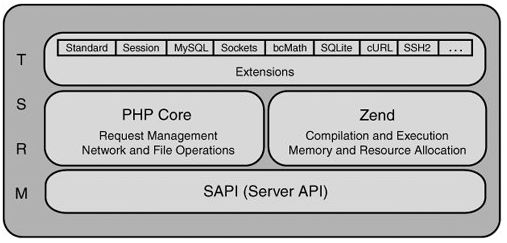从dl('xxx.so');函数分析PHP模块开发
从dl('xxx.so');函数分析PHP模块开发
author: selfimpr
blog: http://blog.csdn.net/lgg201
mail: lgg860911@yahoo.com.cn
转载请声明出处.
最近在学习PHP模块开发相关的知识, 再看了dl()函数的流程之后, 对模块加载的处理流程做一个总结, 希望可以在PHP模块开发上帮助到大家.
进入正题.
blog: http://blog.csdn.net/lgg201
mail: lgg860911@yahoo.com.cn
转载请声明出处.
最近在学习PHP模块开发相关的知识, 再看了dl()函数的流程之后, 对模块加载的处理流程做一个总结, 希望可以在PHP模块开发上帮助到大家.
进入正题.
PHP的代码架构
上图摘自Extending and Embedding PHP(Sams).
从图中可以看出, PHP所有的部分都处在一个被称为TSRM的层中, TSRM层是负责线程安全管理的. 最底下的SAPI是对外提供服务的接口, 比如命令行的sapi为cli, php-fpm则是fastcgi的sapi, apache的模块方式也是一种sapi.
中间是PHP内核和Zend 引擎. 从图中的文字可以看出, PHP内核负责请求管理/网络和文件操作, Zend内核则负责编译和执行/内存和资源的分配.
在所有这些之上, 是扩展层, PHP中多数对外接口都是通过扩展层来提供的, 比如, standard, string等语言基础也被以扩展形式提供.
扩展(以后称为模块)加载到PHP中的方式有两种: 静态编译, 动态链接.
静态编译需要重新生成php的configure脚本, 这里不再赘述. 动态链接方式是将模块编译为一个.so文件, 然后动态的加载到php中.
加载.so文件的方式有两种, 一种是将其写到php.ini文件中, 比如: extension=apc.so, 另外一种就是在代码中使用dl(‘xxx.so’).
dl($library)
函数的作用就是把一个模块加载进来, 使其内部提供的能力可用.
dl()函数的源代码在PHP源代码根目录(简写为PHP_SRC_HOME)下, PHP_SRC_HOME/ext/standard/dl.c, 处理关键流程如下:
PHP_FUNCTION(dl)
PHPAPI PHP_FUNCTION(dl)
{
//...
php_dl(filename, MODULE_TEMPORARY, return_value, 0 TSRMLS_CC);
//...
}
php_dl
PHPAPI void php_dl(char *file, int type, zval *return_value, int start_now TSRMLS_DC)
{
if (php_load_extension(file, type, start_now TSRMLS_CC) == FAILURE) {
//...
}
php_load_extension
PHPAPI int php_load_extension(char *filename, int type, int start_now TSRMLS_DC) {
//文件名解析相关
//加载动态链接库
handle = DL_LOAD(libpath);
//加载错误处理
//获取模块的get_module函数(重点, 模块初始入口)
get_module = (zend_module_entry *(*)(void)) DL_FETCH_SYMBOL(handle, "get_module");
//get_module函数获取错误处理
//那个get_module()得到struct zend_module_entry
module_entry = get_module();
//...
//注册模块(重点, 函数在这里被注册)
if ((module_entry = zend_register_module_ex(module_entry TSRMLS_CC)) == NULL) {
//错误处理
}
//模块启动(重点, PHP_MINIT_FUNCTION)
if ((type == MODULE_TEMPORARY || start_now) && zend_startup_module_ex(module_entry TSRMLS_CC) == FAILURE) {
//错误处理
}
//模块请求启动(重点, PHP_RINIT_FUNCTION)
if ((type == MODULE_TEMPORARY || start_now) && module_entry->request_startup_func) {
//错误处理
}
return SUCCESS;
}
流程中的重点问题
get_module函数
get_module = (zend_module_entry *(*)(void)) DL_FETCH_SYMBOL(handle, "get_module");这一句代码经过宏扩展之后如下:
get_module = (zend_module_entry *(*)(void)) dlsym(handle, "_get_module");google一下dlsym()函数是干什么的, 我们很容易理解这一句代码, 这是从刚才加载的动态链接库中获取了一个函数指针, 也就是我们在开发模块的时候定义的get_module函数.
大家可以去看看PHP_SRC_HOME/ext/下的扩展主文件中, 都会有类似你的代码:
#ifdef COMPILE_DL_SAMPLE ZEND_GET_MODULE(sample) #endif经过宏展开为(暂不考虑针对GNU的__attribute__和针对C++的extern “C”):
zend_module_entry *get_module(void) { return &sample_module_entry; }通过把dl()函数的加载过程和模块开发时的定义联系起来, 我们可以看到, 模块被加载的时候, 我们自定义的zend_module_entry从这里被传递出去.
模块的注册
module_entry = zend_register_module_ex(module_entry TSRMLS_CC)上面的代码是从函数php_load_extension中摘出的, 我们继续深入zend_register_module_ex()找到我们关注的函数注册:
if (module->functions && zend_register_functions(NULL, module->functions, NULL, module->type TSRMLS_CC)==FAILURE) {继续深入到zend_register_functions函数中:
ZEND_API int zend_register_functions(zend_class_entry *scope, const zend_function_entry *functions, HashTable *function_table, int type TSRMLS_DC) /* {{{ */ {
//...
//重点 如果没有函数符号表, 取全局函数符号表
if (!target_function_table) {
target_function_table = CG(function_table);
}
//...
//重点 循环zend_function_entry[]
while (ptr->fname) {
//向函数符号表增加函数
if (zend_hash_add(target_function_table, lowercase_name, fname_len+1, &function, sizeof(zend_function), (void**)®_function) == FAILURE) {
//错误处理
}
//...
//准备遍历zend_function_entry[]下一个元素
ptr++;
//...
}
//...
return SUCCESS;
}在获取函数符号表的时候, 使用了CG宏:
target_function_table = CG(function_table);我们分两种情况解开这个宏:
//非线程安全 compiler_globals.function_table //线程安全 (((zend_compiler_globals *) (*((void ***) tsrm_ls))[ compiler_globals_id - 1])-> function_table)最终, 它们获取的都是一个全局结构struct zend_compiler_globals中的function_table元素, 该元素是一个HashTable.
下面的循环就很好理解了, 把模块开发时zend_function_entry中的函数遍历增加到HashTable中就OK了.
模块启动/模块请求启动
这两个部分是很容易理解的, 分别对应的是模块开发中的PHP_MINIT_FUNCTION()和PHP_RINIT_FUNCTION()一个最简单的模块
在介绍了上面的内容后, 开发一个PHP模块的思路应该会清晰很多.我们假设模块的名称为”sample”, 有一个头文件和一个源文件, 首先是头文件:
#ifndef PHP_SAMPLE_H /* 预防多次包含 */ #define PHP_SAMPLE_H /* 定义扩展属性 */ #define PHP_SAMPLE_EXTNAME "sample" #define PHP_SAMPLE_EXTVER "1.0" /* 引入源文件外部的配置选项 */ #ifdef HAVE_CONFIG_H #include "config.h" #endif /* 包含PHP标准头文件 */ #include "php.h" /* 定义入口指针符号, Zend在加载的时候使用它 */ extern zend_module_entry sample_module_entry; extern zend_function_entry sample_functions[]; #define phpext_sample_ptr &sample_module_entry /* 定义函数 */ PHP_FUNCTION(sample_hello_world); #endif /* PHP_SAMPLE_H */接下来是源文件:
#include "php_sample.h"
zend_module_entry sample_module_entry = {
#if ZEND_MODULE_API_NO >= 20010901
STANDARD_MODULE_HEADER,
#endif
PHP_SAMPLE_EXTNAME,
sample_functions, /* Functions */
/* 本例没有实现这些方法,不过实现和普通方法基本一致 */
NULL, /* MINIT */
NULL, /* MSHUTDOWN */
NULL, /* RINIT */
NULL, /* RSHUTDOWN */
NULL, /* MINFO */
#if ZEND_MODULE_API_NO >= 20010901
PHP_SAMPLE_EXTVER,
#endif
STANDARD_MODULE_PROPERTIES
};
#ifdef COMPILE_DL_SAMPLE
ZEND_GET_MODULE(sample)
#endif
/* 函数入口 */
zend_function_entry sample_functions[] = {
PHP_FE(sample_hello_world, NULL)
{NULL, NULL, NULL}
};
/* ------------------- 函数定义 -----------------------*/
PHP_FUNCTION(sample_hello_world)
{
php_printf("Hello world!\n");
}
